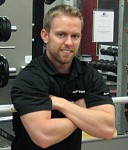Over the next month we will be previewing the 2013 BSMPG Summer Seminar speakers, their thoughts on the current state of Sports Medicine & Performance Training, how technology is influencing our profession (for better or worse) and preview their lectures.
Enjoy.


Director of Athletic Development & Athletic Development Coach
Kevin Neeld is the President, COO, and Director of Athletic Development at Endeavor
1. How has the field of sports medicine/performance changed in the last five years? Where do you see the field headed in the next five years?
Sports performance is a constantly evolving field, but over the last few years it seems like people are paying more attention to the importance of grooving fundamental movement patterns, addressing common mobility restrictions, and redefining “core” work to include more “anti-movement” exercises and exercise that address the pelvis, thorax, and neck. These changes, in large part, are a result of the seminars and lectures that guys like Gray Cook, Michael Boyle, Charlie Weingroff, and Eric Cressey (among others) have put on.
In the same vein, the fields of performance training and rehabilitation continue to merge such that professionals on both ends of the continuum are learning from one another, sharing information, and ultimately gaining a better appreciation for where their clients fall along that progression and what skills they can utilize (or develop) to help move them in the right direction. From a training perspective, this has become increasingly important given the adaptations that result from living a dichotomous life of sedentary behavior and high-level athletics, which seems to be the societal trend, at least in our country. More athletes are presenting with structural abnormalities such femoroacetabular impingement or acquired postural dysfunction that significantly affects their ability to breathe, move, and ultimately to adapt favorably. Understanding the signs and implications of these dysfunctions puts the training professional in a much better position to help the athlete fulfill his or her potential. A platform of quality static posture and dynamic movement must be established in order to develop durable elite-level physical capacities.
As for the future, I think we’ll continue to see:
An increased recognition of the benefits of manual therapy
While it’s possible to over-utilize or become over-reliant on manual therapy, different manual modalities are extremely effective at troubleshooting soft-tissue dysfunction, which can provide for a faster “reset” in function and movement quality, and remove pain, which allows for the development of a cleaner motor pattern (and happier athlete). Manual work can also be used to stimulate a parasympathetic shift in athletes, which has a number of physiological consequences, but ultimately allows the athlete to recover faster.
An increased focus on recovery and management of training, dietary, environmental, and lifestyle stressors
As technology and our understanding of the human organism continue to develop, monitoring and manipulating specific and non-specific stress responses will become more feasible. As a few examples that are already gaining traction, heart rate variability and sleep quality can be easily and inexpensively assessed using BioForce HRV and Zeo Sleep Manager, respectively, nutrient and hormone levels can be self-assessed at home using tests from Bioletics, and recovery or “restoration” can be altered while you sit at a desk or sleep using Earthing products. All of these tools are likely to be refined over time to provide more information, a greater benefit, be more user-friendly, or simply more accessible (e.g. cheaper).
A shift toward greater individualization in program design
In the last few years, this shift has taken place with regard to identifying movement limitations and taking an individualized approach toward restoring fundamental movement patterns through the use of different corrective exercises and changes to exercise selection within the program. I think the next step, one that many are already starting to make, is to take the same approach toward identifying strengths/weaknesses in the individual’s various physical capacities and programming energy system work (which is really the entire program) based on the individual’s profile. This is an area I’ve learned a lot about from guys like Patrick Ward, Joel Jamieson and Dave Tenney. This form of programming is as much an art as it is a science, but you need to know the science to perfect the art!
2. Athlete monitoring and sports analytics has emerged as leading topics within Sports Medicine and Performance Training, how has this field influenced your practice? Has the field in your opinion gone too far with some professionals becoming slaves to data sets instead of providing solid clinical practice and coaching? Is there room for more monitoring? What "data sets" are you seeing as most impactful when is comes to providing athlete care and training?
I think it’s inherently good when you have a means of monitoring the effectiveness of your program. Technological advancements have provided an additional means of doing so, which will ultimately allow us to be more specific in the application of stressors. Tracking heart rate and kinematic data (e.g. GPS-drive data) over the course of training, practices, and competitions can provide extremely valuable information to coaches about the amount of absolute and relative stress applied to an individual that day. I think this data will continue to show significant differences even between two players at the same position that went through the same practice. Likewise, tracking HRV throughout the year provides evidence as to how the individual is responding to and recovering from these stressors. Taking a step back, all of this information, in conjunction with movement assessments/screens like the FMS and more traditional “performance” data (e.g. 40-yard dash time, vertical jump height, 1-RM resistance training numbers, conditioning test performance, etc.) provides the coach with an audit as to how effective their program is for that individual.
All that said, I think some of this data in certain circumstances will undermine the psychological strength of certain athletes. The reality is that the majority of team sport athletes experience some degree of fatigue accumulation, but they still perform. If an athlete’s HRV is less than optimal on a game day, it’s possible they may be at a greater risk of injury or getting sick, but it’s also possible they won’t. While this is a bit of a roulette game, I think the important thing is to collect, analyze, and track the information, but don’t become imprisoned by it.
3. What can attendees expect to hear from you at the 2013 BSMPG Summer Seminar? How may your lecture impact their practice on Monday morning?
The purpose of my talk will be to describe common structural and functional deviations that affect the hockey athlete, their implications, and consequent programming strategies. This discussion will address topics like the consequences of FAI on exercise performance, exercise selection, and skating technique, and how diaphragm position and function impacts core stability, shoulder health, and the athlete’s ability to recover. This talk should provide the attendee with a deeper appreciation for the postures and patterns they see on an everyday basis, as well as simple cues, exercises, and programming strategies to best serve the athlete.

Super Discounted Rates End December 31st, 2012!
Sign Up Today











